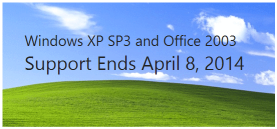 In 2002 Microsoft introduced its Support Lifecycle policy based on customer feedback to have more transparency and predictability of support for Microsoft products. As per this policy, Microsoft Business and Developer products, including Windows and Office products, receive a minimum of 10 years of support (5 years Mainstream Support and 5 years Extended Support), at the supported service pack level.
In 2002 Microsoft introduced its Support Lifecycle policy based on customer feedback to have more transparency and predictability of support for Microsoft products. As per this policy, Microsoft Business and Developer products, including Windows and Office products, receive a minimum of 10 years of support (5 years Mainstream Support and 5 years Extended Support), at the supported service pack level.
As a consequence, Windows XP SP3 and Office 2003 will go out of support on April 8, 2014. If your organization has not started the migration to an alternative predating system, you are not too late. However, based on historical customer deployment data, the average enterprise deployment can take anything from 2 to 18 months from business case through full deployment. To ensure you remain on supported versions of Windows and Office, you should begin your planning and application testing immediately to ensure you deploy before end of support.
There has been much debate online as to the practical issues that will affect businesses from this date. Some IT experts are predicting the release of new malware to exploit flaws in the operating system, which will remain unpatched. There are more subtle issues which will unfold, as printers, and other 3rd party software no longer support XP which results in incompatibility issues where (over time) programs fail to work. Whatever your personal opinion, one thing is clear, this will have an impact. This may not have a direct impact on the 8th April, but a migration policy is something that does need to be planned for.